Amid competition at the ‘Writing With Fire’ Oscars, filmmakers Rintu Thomas and Sushmit Ghosh look back on why they decided to follow three Dalit journalists for five years
Amid competition at the ‘Writing With Fire’ Oscars, filmmakers Rintu Thomas and Sushmit Ghosh look back on why they decided to follow three Dalit journalists for five years
Six years ago, when filmmakers Rintu Thomas and Sushmit Ghosh from New Delhi attended a meeting Khabar Lahariya Office in Chitrakoot, Uttar Pradesh, little did he know how deeply he would soon become involved with the lives and work of women journalists there.
And they certainly wouldn’t have guessed that the narrative they were about to weave into a documentary would premiere one day at the Sundance Film Festival, where it would win two awards—followed by similar accolades at several other festivals—and eventually a single. Received an Oscar nomination in the Best Documentary category. This is a first for a feature length documentary produced and directed by Indian filmmakers.
Rintu Thomas and Sushmit Ghosh | photo credit: special arrangement
thomas and ghosh film, writing with fireremarkable story of Khabar Lahariya (Waves of News), the only Indian media organization run by Dalit women – operating in small towns and rural areas of the Hindi belt where patriarchy reigns – as they attempt to move from print to digital journalism. Filmed over five years, it is the story of determined journalists, some mothers and others, and their commitment to press freedom.
“Journalism is the essence of democracy,” says Meera Devi, one of the film’s main characters. that too the first Khabar Lahariya The journalists, whose 35-year-old Thomas and 39-year-old Ghosh had seen the women at the meeting six years earlier, were attracted. “When citizens demand their rights, it is us journalists who can take their demands to the government. Journalists should use this power responsibly. Otherwise the media will also become like any other business.
When you watch the film, you realize that Meera and her colleagues never shy away from a story, not even when it investigates a project like the 2014 Swachh Bharat Mission, in which every household in the country Was promised toilet facilities. While one woman they interview reveals the embarrassment of still relieving herself outside, another calls the announcement made in 2019 – that rural India is open defecation free – “a lie”.
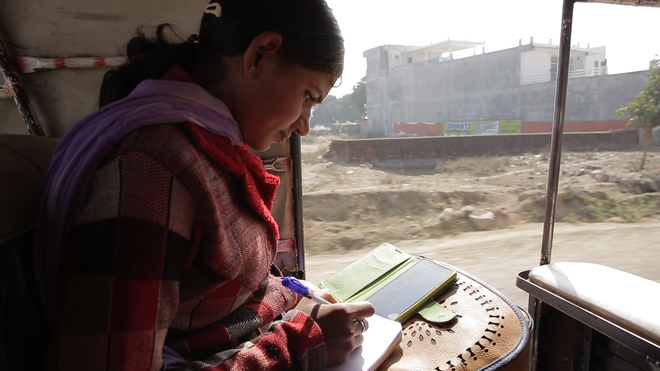
Sunita Prajapati | photo credit: Black Ticket Films
This is not a victim story
Mira is a natural leader, says Thomas. She and Ghosh were also impressed by the energy of Sunita Prajapati, who loves print and is reluctant to switch to digital. Became a former child minor reporter, she questions everything and doesn’t take anything at face value. Shyamkali Devi, a domestic abuse survivor, is the third journalist they focus on – a timid woman who is much quieter than her peers.
after one week Khabar Lahariya In the office, the director duo reminds women to be curious about how long they will be filmed and what the story will be. “We knew immediately that this would not be a short film as the story needed more time,” says Ghosh. “So, we told them it might take a few years.”
Thomas adds: “We also knew that it would not be a victim story or about women’s empowerment – a kind of superheroine story because it dehumanizes people. We told Meera, Sunita and Shyamkali that our film would be about them. Who they were, and their spirit.
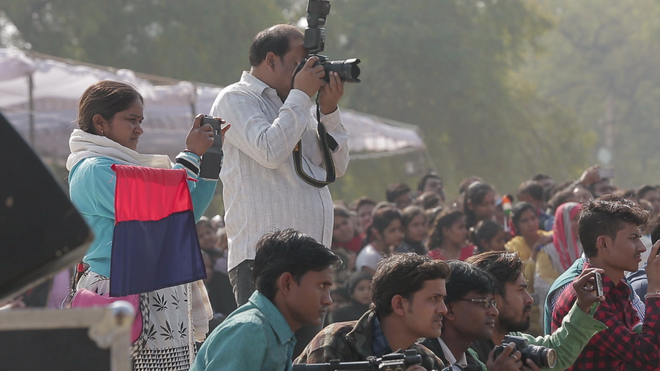
Mira in the field photo credit: Black Ticket Films
their spirits cannot be tamed
writing with fire Follows three women as they first learn, and then train their peers to go digital – scenes show them struggling to operate and edit video cameras on their new smartphones. The film tracks them battling domestic responsibilities and pressures, while traveling long distances to cover reports about illegal mining, rapes, murders and interviewing police officers and politicians when Uttar Pradesh went to polls in 2017. Were.
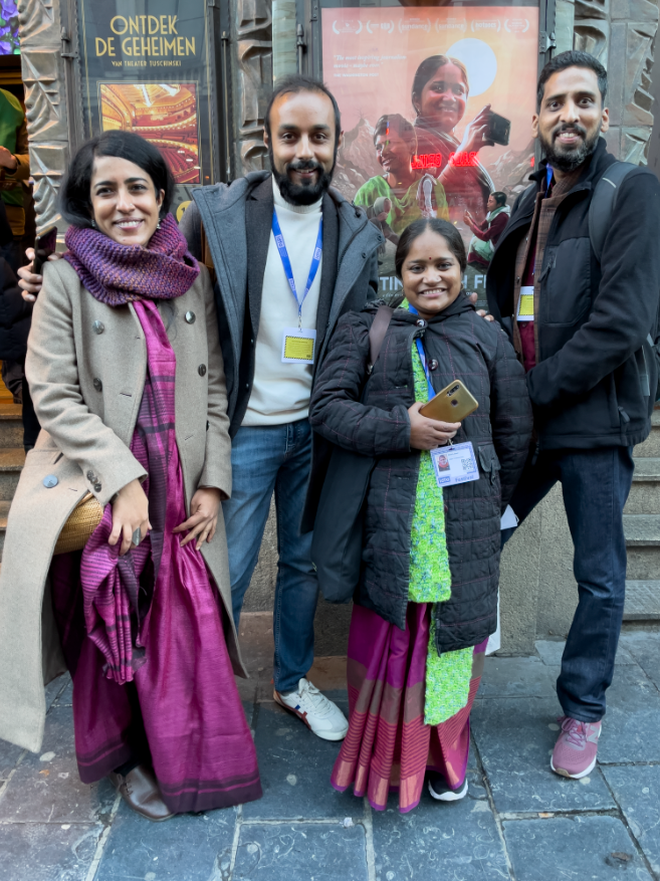
writing with fire Team and Mira in Amsterdam | photo credit: Black Ticket Films
Women have grown up experiencing violence and discrimination because of who they are. When they report in the field, they are mostly met by upper caste men, who appear to tolerate them. But they often face real animosity. “You must speak within your limits,” an upper caste man says in the film. The disturbing phone calls also pepper the story with the women, reminding viewers of the dangers at work.
You would think that the presence of filmmakers in the city would make a difference, but it was not. “In IDFA” [International Documentary Film Festival Amsterdam] During the screening, Meera was asked by the audience if our presence encouraged her. And she said, ‘In the first year, I was really scared for these three’ [the filmmakers and cinematographer Karan Thapliyal] Because we are not used to people from the city coming to illegal mines or police stations,’ says Ghosh.
Thomas says, “We were town kids, so to speak. We’d stand out. Most of the people out there eventually found out that a movie was being made. Khabar Lahariya, And they often thought, ‘But why?’ Too often, politicians or police officers say, ‘Oh, you guys are back?'”
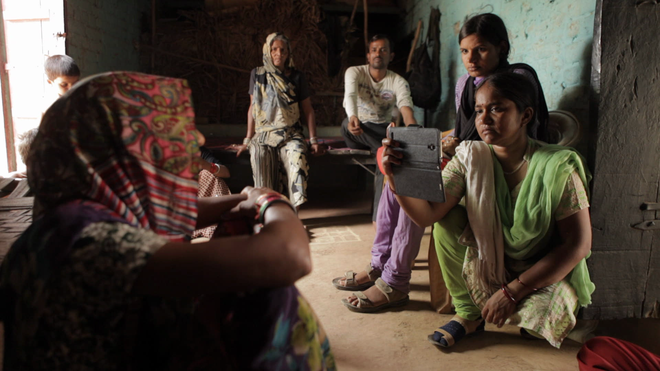
Meera Devi | photo credit: Black Ticket Films
Now to catch the eye of the Academy
As the filmmakers worked on the film, raised funds, and were doing post-production, they were clear about one thing – they wanted the main producer credits to go to them, to make sure they were able to ‘produce’ the film. owned’, and could make editorial decisions about what the story was about to happen.
“What India looks and feels like is a question that often arises in the West,” says Ghosh. It was important for us to restructure and reinvent how the West thinks about what we can and imagine the Global South can do. I think the fact that we did an Oscar nomination It has broken so many paradigms about running an academy, because it has never happened before.
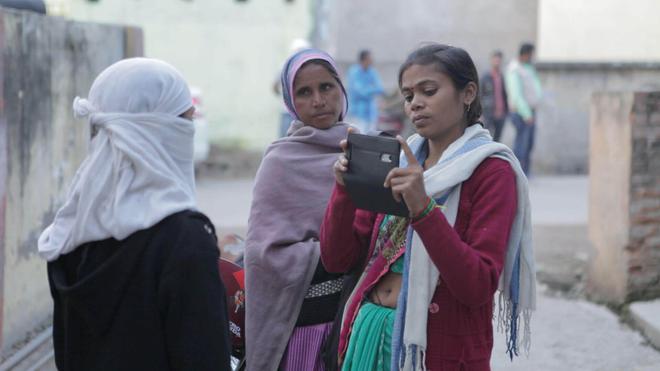
Shyamkali Devi | photo credit: Black Ticket Films
For the promotion campaign after the nominations, the filmmakers hired a US-based publicist, as many films try to attract the limited attention of Academy members. What was probably a small initial budget to cover the shooting in Uttar Pradesh, and the post-production work in Manali, would have swelled considerably during the final leg of promotions leading up to the Oscars ceremony on March 27. (However, the filmmakers did. Don’t want to put down the number.)
Along the way, to speed up writing with fire, he also sought help from some well-known names who would give the project maximum exposure in international festivals and award circuits. One such person — who came on board as the film’s executive producer — is Patty Quillin. She has lent her name to projects such as the famous documentary truffle hunter (2020) and feature film Mughal Mowgli (2020), starring Riz Ahmed. Quillin is married to Netflix founder and CEO Reed Hastings, but it’s a profile she doesn’t like to brag about.
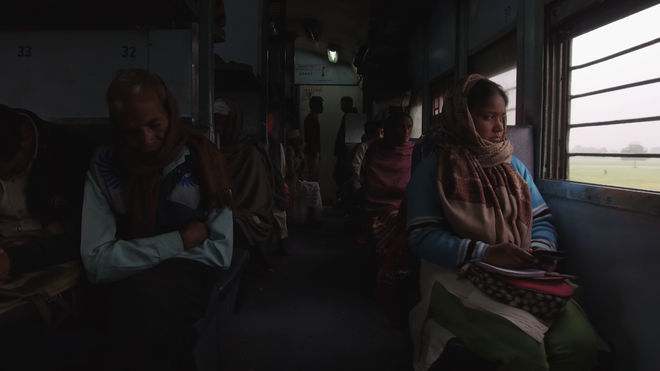
Meera traveling for a story photo credit: Black Ticket Films
When can we see it?
In the post-Oscars scenario, filmmakers are expected to share the film with audiences in India. But they don’t have the clarity yet – it’s going to be a tough road writing with fire, given that the tradition of releasing documentaries theatrically is not very much. Says Ghosh, “We do not have any distribution offers from streamers in India as of now.
“Patty distances herself from Netflix conversations like the plague. That’s the trap she falls into, too,” says Thomas. “She told us, ‘I really believe what you’re going to do with the movie. And I trust you. And that’s it. It was great to have someone who is invested in the film and the process.”
Now that Thomas and Ghosh prepare to attend the Academy Awards ceremony in Los Angeles, they are hoping that they can take Mira with them. “It would be something to walk her on the red carpet,” Thomas says. “That would be a statement.”